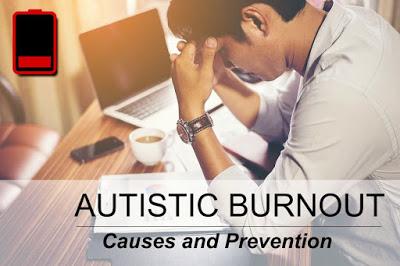
In some of my other posts, I've talked about meltdowns, which are when people on the autism spectrum lose control. I've also talked about the quieter form of meltdown; the "shutdown" where an individual is unable to connect with the outside world.
Meltdowns and shutdowns are transitory things, they happen and they pass. They're also usually quite short, lasting at most, for a few hours.
When a person with autism experiences a condition similar to a shutdown that lasts for days or even for the rest of their life, it's something else. It's called autistic burnout.
The symptoms
The symptoms of autistic burnout will vary significantly from person to person but there are a few common signs;Inability to cope with daily life
Autistic burnout is often compared with a mental breakdown for good reason. They're very similar. A person may be coping well with the pressures of family or working life and then may suddenly become incapable of continuing. This may mean that they're incapable of leaving the house, going to work or doing even the simplest of tasks.A person going through autistic burnout may find it impossible to engage with anyone but their closest and most understanding friends and family. Even then, they may find that they can't interact for long. Activities that they once loved, such as reading or even watching television or playing computer games may simply be too much effort for them.
Regression
In younger children, autistic burnout can lead to a regression of abilities. A child who is toilet trained may regress to the point where they are no longer able to use the toilet. Similarly, a child who has reasonable language development for their age may regress to a point where they lose speech entirely. Autistic burnout at a young age may be one of the reasons that immunisation was once suspected as being a cause of autism.The Causes
Autistic burnout is generally caused by someone trying to do more than they're physically or mentally able to. By constantly overstretching themselves, people with autism can push themselves to the limit -- and beyond.It's something that could happen to anyone but people with autism are particularly prone to the issue for a number of reasons;
Go Hard or Go Home
One of the traits that people with autism have, particularly when it comes to their special interests, is that they don't know when to stop. It's quite common for people with autism to work to the point where they injure themselves because they attempt to overachieve. They'll commit to achieving major amounts of work in a short space of time (and they'll hit those targets) or they'll master a new skill in an incredibly short period of time by cutting out other essential activities such as eating or sleeping.Sensory Issues
Most people with autism have at least a few sensory issues. Some don't like touch, some are sensitive to smells, others have difficulty with sounds or taste. Many people with autism are sensitive to several senses at once which makes daily life a struggle. It means that things that take little effort from other people often require a much greater effort from them.Anxiety
Anxiety is arguably the most common of the autistic traits. People with autism battle many forms of anxiety daily; these can include social anxiety, separation anxiety, change anxiety, general anxiety or specific forms of anxiety such as obsessive compulsive disorder, post traumatic stress disorder, panic disorder or phobias including agoraphobia. Navigating life with these anxieties is difficult and stressful -- and it takes a toll on the individual.Pretending to be "normal"
People usually expect others to behave "normally". This is particularly the case in the workplace. Pretending to be normal involves suppressing your natural urges and responses and trying to fit in.It means that at times, you need to push your anxiety deep down and do the things that make you anxious without appearing anxious. It means that if a colleague comes up and touches you, and you have issues with touch, you need to suppress any reactions you might have. The same goes for changes in the workplace. Pretending to be normal is an exhausting process and people with autism often need to seek some time-out before they can rejoin the fray.
Lack of Downtime
People with autism tend to exhaust themselves in interactions with others but can regain some of their capabilities with a little alone-time. Sometimes that alone-time is in a room by themselves and sometimes it takes the form of a walk or other exercise where they're cut off from the rest of the world.Some of the recent changes in workplace practices, particularly "lunch and learn" where employees are expected to bring their lunch to meetings instead of seeking lunchtime solitude can really play havoc with this downtime.
Other changes in the workplace include longer working hours and "always-on" contactability via mobile calls, emails on the go and video meetings via technologies such as Skype and FaceTime make downtime difficult to maintain.

Downtime is critical to continued functioning
Prevention and Living on the Edge
Autistic burnout can take a person with autism out of the workplace (or away from their family) for a week, a month, for years or even permanently. It's something that needs to be avoided at all costs. It's very much a case of prevention being much better than a cure.People with autism need to be aware of the risks of autistic burnout and the things that they need to do to reduce the chances of it happening to them. Here's a few do's and don'ts to get you started;
- Don't try to be "normal", be yourself and let people accept who you are.
- Don't climb too high on the corporate ladder at work; the higher you are the more people interactions you need to have.
- Don't let work push you into constant contact or constant meetings. Everyone is entitled to breaks; it's the law.
- Do be mindful when you're head and shoulders above the rest, chances are that you're putting too much effort into something.
- Do educate yourself (and your colleagues) on spoon theory. It's a great way to illustrate to your friends and colleagues how effort can leave you depleted.
- Do accept help (and do delegate tasks) at home and at work. Sure, people won't meet your standards of "perfection" but you won't burn out either.
- Do be aware of sensory challenges around you and take steps (eg: earphones) to reduce their impact on you.
If you're already affected by autistic burnout. You really need to seek some assistance to get back on your feet. It's not something that you can do alone.

